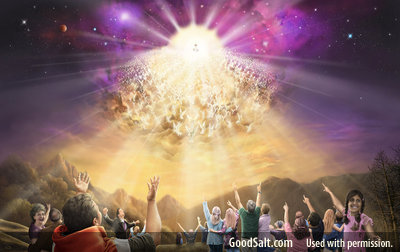“Then this saying went out among the brethren that this disciple would not die. Yet Jesus did not say to him that he would not die, but, ‘If I will that he remain till I come, what is that to you?’ ” John 21:23
As we look at the focusing stage of discipleship in the life of Peter (John 21:20-23), we are learning to follow Jesus without reservation. So far, we have discovered we can do this when we…
– Avoid comparing ourselves with other followers of Christ (John 21:20-21).
– Focus on serving Jesus in our own unique ministry to others (John 21:22).
The final way to follow Jesus without reservation is to SILENCE FALSE RUMORS AND FOCUS ON JESUS’ SOON RETURN (John 21:23). After Jesus informed Peter that following Him would cost Peter his life, Peter wanted to know what John could expect for following Jesus (John 21:18-21). Jesus told Peter not to concern himself with God’s will for John, but to focus on following Christ (John 21:22).
John then acknowledges a false rumor that had spread due to a simple misunderstanding of Jesus’ words. John writes, “Then this saying went out among the brethren that this disciple would not die. Yet Jesus did not say to him that he would not die, but, ‘If I will that he remain till I come, what is that to you?’ ” (John 21:23). Many of the early Christians came to believe that the apostle John would not die but would live until Jesus returned to earth. Augustine refers with disapproval to some who insisted in his day “that the apostle John is still living, lying asleep rather than dead in his tomb in Ephesus” (Homilies on the Gospel of John 124). 1
John addresses the error by repeating word for word the rhetorical question asked by Jesus in verse 23. These words of Jesus were not an indication of Jesus’ will for John, but of His will for Peter. Jesus had not said John would live until His Second Coming. He had merely raised the possibility in the context of a hypothetical situation to emphasize that God’s will for John was not to be Peter’s concern. So, John reports how the rumor got started and then handles Christ’s word accurately to correct the misunderstanding.
This clarification by John was very important, because when John died, some people might have falsely concluded that Jesus had not been faithful to His promise to return. Others might conclude that John’s gospel was not reliable. However, Jesus had spoken of a hypothetical possibility in this instance. His words were not a promise. 2
We probably hear rumors every day. Misinformation that gets circulated. Every week on Facebook we have people trying to spread false rumors about Christianity on our See You in Heaven page. Rumors that say, “Jesus is not God. The Bible is corrupted. Heaven does not exist. Christianity is borrowed from second century paganism. Jesus did not really die on the cross. He merely swooned or fainted and was resuscitated in the tomb. Going to heaven is based on behavior, not believing. Believing in Christ is worthless. Christ has already come back to earth a second time.” And on and on the rumors go.
Like John, we need to silence rumors by sharing the truth with rumor-spreaders. Otherwise, some of those rumors can hinder us from following Christ without reservation, especially those that undermine Jesus’ trustworthiness and the reliability of the Bible.
But when we do share the truth with those who are spreading false rumors, we need to do so graciously. The apostle Paul writes, “24 And a servant of the Lord must not quarrel but be gentle to all, able to teach, patient, 25 in humility correcting those who are in opposition, if God perhaps will grant them repentance, so that they may know the truth, 26 and that they may come to their senses and escape the snare of the devil, having been taken captive by him to do his will.” (2 Timothy 2:24-26). As servants of the Lord, we are to be known for being “gentle” and patient,” and having “humility” when dealing with those who are opposed to the truth. Why? So “those who are in opposition” can be led to “repentance, so that they may know the truth” rather led to “disputes” and “strife” (2 Timothy 2:23). Our goal is to help people “come to their senses and escape the snare of the devil.” This will not happen if we are being argumentative and cruel to rumor-spreaders.
When John wrote the hypothetical question in verse 23, “he was like believers today in this regard: he knew Jesus’ return was imminent (1 John 2:18, ‘Little children, it is the last hour’), but he could not be sure whether he would taste death before He did return.” 3
It is important to recognize that Jesus’ last words recorded in the gospel of John pertain to His return to earth (John 21:22-23). Focusing on Christ’s return is one of the greatest motivations for following Christ without reservation. Knowing that Jesus could return for His church at any moment (John 14:2-3; I Corinthians 15:51-58) gives us great incentive to faithfully serve Christ now.
After describing the Rapture or sudden removal of the church at any moment in detail (I Thessalonians 4:13-5:10), Paul concludes, “Therefore comfort each other and edify one another, just as you also are doing.” (I Thessalonians 5:11). The soon coming of the Lord Jesus is intended to motivate us to “comfort each other and edify one another,” not afflict one another and tear each other down. The imminent return of Christ for His church gives us incentive to faithfully serve Jesus until He comes back for us.
For example, when I played football my first year of college, we would have three-a-day practices in the heat of August to prepare for our games in the fall. So many times, I wanted to quit those practices because of the heat and exhaustion, but what kept me going was the approval of our defensive line coach. Hearing him say, “Good job, Ropp. You are going to be glad you did this,” helped me keep going.
Knowing that Jesus is coming back one day to reward those who are faithful to Him keeps me motivated to keep following Him no matter what the cost. I long to hear him say to me, “Well done, good and faithful servant; you have been faithful over a few things, I will make you ruler over many things. Enter into the joy of your lord.” (Matthew 25:23).
Pray: Lord God Almighty, many of us need a reminder of what is important in life. So often we get focused on what is temporary and lose sight of what is eternal. Thank You, Lord, for reminding us to silence false rumors, especially as they relate to Your coming back to earth. Please enable us to be gentle and humble as we share the truth with those who are opposed to it. Use us to help people come to repentance so they can escape the bondage of Satan who often promotes falsehoods to mislead people away from You and Your truth. Knowing You could come back today for Your church is intended to motivate us follow You without reservation so we can receive eternal rewards from You in the future. Lord, we want to hear You say, “Well done, good and faithful servant; you have been faithful over a few things, I will make you ruler over many things. Enter into the joy of your lord.” In the mighty name of the Lord Jesus Christ, we pray. Amen.
ENDNOTES:
1. J. Carl Laney Moody Gospel John Commentary (Chicago: Moody Press, 1992), pg. 382.
2. Tom Constable, Notes on John, 2017 Edition, pg. 401.
3. Robert Wilkin; J. Bond; Gary Derickson; Brad Doskocil; Zane Hodges; Dwight Hunt; Shawn Leach. The Grace New Testament Commentary: Revised Edition (Grace Evangelical Society, Kindle Edition, 2019), pp. 569-570.



